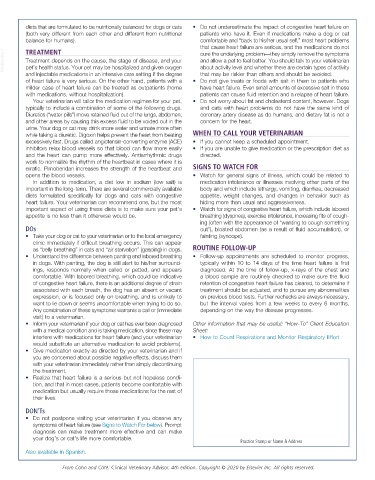Page 3018 - Cote clinical veterinary advisor dogs and cats 4th
P. 3018
diets that are formulated to be nutritionally balanced for dogs or cats • Do not underestimate the impact of congestive heart failure on
(both very different from each other and different from nutritional patients who have it. Even if medications make a dog or cat
balance for humans). comfortable and “back to his/her usual self,” most heart problems
that cause heart failure are serious, and the medications do not
TREATMENT
VetBooks.ir Treatment depends on the cause, the stage of disease, and your and allow a pet to feel better. You should talk to your veterinarian
cure the underlying problem—they simply remove the symptoms
pet’s health status. Your pet may be hospitalized and given oxygen
about activity level and whether there are certain types of activity
and injectable medications in an intensive care setting if the degree that may be riskier than others and should be avoided.
of heart failure is very serious. On the other hand, patients with a • Do not give treats or foods with salt in them to patients who
milder case of heart failure can be treated as outpatients (home have heart failure. Even small amounts of excessive salt in these
with medications, without hospitalization). patients can cause fluid retention and a relapse of heart failure.
Your veterinarian will tailor the medication regimen for your pet, • Do not worry about fat and cholesterol content, however. Dogs
typically to include a combination of some of the following drugs. and cats with heart problems do not have the same kind of
Diuretics (“water pills”) move retained fluid out of the lungs, abdomen, coronary artery disease as do humans, and dietary fat is not a
and other areas by causing this excess fluid to be voided out in the concern for the heart.
urine. Your dog or cat may drink more water and urinate more often
while taking a diuretic. Digoxin helps prevent the heart from beating WHEN TO CALL YOUR VETERINARIAN
excessively fast. Drugs called angiotensin-converting enzyme (ACE) • If you cannot keep a scheduled appointment.
inhibitors relax blood vessels so that blood can flow more easily • If you are unable to give medication or the prescription diet as
and the heart can pump more effectively. Antiarrhythmic drugs directed.
work to normalize the rhythm of the heartbeat in cases where it is
erratic. Pimobendan increases the strength of the heartbeat and SIGNS TO WATCH FOR
opens the blood vessels. • Watch for general signs of illness, which could be related to
In addition to medication, a diet low in sodium (low salt) is medication intolerance or illnesses involving other parts of the
important in the long-term. There are several commercially available body and which include lethargy, vomiting, diarrhea, decreased
diets formulated specifically for dogs and cats with congestive appetite, weight changes, and changes in behavior such as
heart failure. Your veterinarian can recommend one, but the most hiding more than usual and aggressiveness.
important aspect of using these diets is to make sure your pet’s • Watch for signs of congestive heart failure, which include labored
appetite is no less than it otherwise would be. breathing (dyspnea), exercise intolerance, increasing fits of cough-
ing (often with the appearance of “wanting to cough something
DOs out”), bloated abdomen (as a result of fluid accumulation), or
• Take your dog or cat to your veterinarian or to the local emergency fainting (syncope).
clinic immediately if difficult breathing occurs. This can appear
as “belly breathing” in cats and “air starvation” (gasping) in dogs. ROUTINE FOLLOW-UP
• Understand the difference between panting and labored breathing • Follow-up appointments are scheduled to monitor progress,
in dogs. With panting, the dog is still alert to his/her surround- typically within 10 to 14 days of the time heart failure is first
ings, responds normally when called or petted, and appears diagnosed. At the time of follow-up, x-rays of the chest and
comfortable. With labored breathing, which could be indicative a blood sample are routinely checked to make sure the fluid
of congestive heart failure, there is an additional degree of strain retention of congestive heart failure has cleared, to determine if
associated with each breath, the dog has an absent or vacant treatment should be adjusted, and to pursue any abnormalities
expression, or is focused only on breathing, and is unlikely to on previous blood tests. Further rechecks are always necessary,
want to lie down or seems uncomfortable when trying to do so. but the interval varies from a few weeks to every 6 months,
Any combination of these symptoms warrants a call or (immediate depending on the way the disease progresses.
visit) to a veterinarian.
• Inform your veterinarian if your dog or cat has ever been diagnosed Other information that may be useful: “How-To” Client Education
with a medical condition and is taking medication, since these may Sheet:
interfere with medications for heart failure (and your veterinarian • How to Count Respirations and Monitor Respiratory Effort
would substitute an alternative medication to avoid problems).
• Give medication exactly as directed by your veterinarian and if
you are concerned about possible negative effects, discuss them
with your veterinarian immediately rather than simply discontinuing
the treatment.
• Realize that heart failure is a serious but not hopeless condi-
tion, and that in most cases, patients become comfortable with
medication but usually require those medications for the rest of
their lives.
DON’Ts
• Do not postpone visiting your veterinarian if you observe any
symptoms of heart failure (see Signs to Watch For below). Prompt
diagnosis can make treatment more effective and can make
your dog’s or cat’s life more comfortable.
Practice Stamp or Name & Address
Also available in Spanish.
From Cohn and Côté: Clinical Veterinary Advisor, 4th edition. Copyright © 2020 by Elsevier Inc. All rights reserved.

